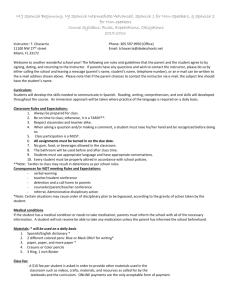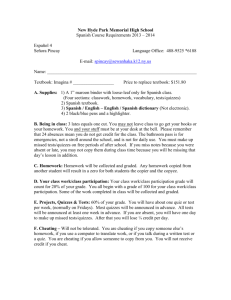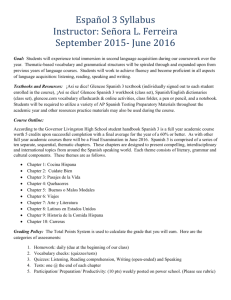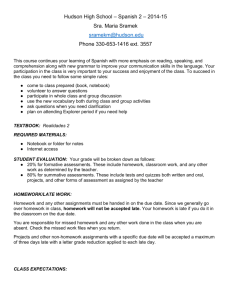syllabus – español 3-4 - Point Loma High School
advertisement
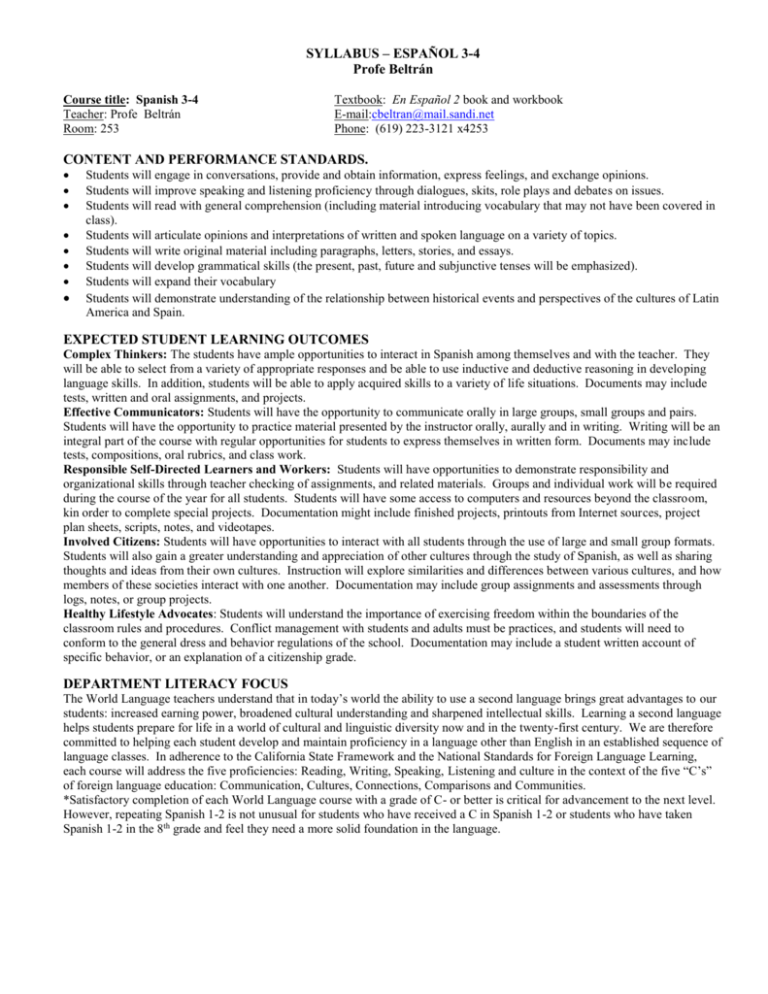
SYLLABUS – ESPAÑOL 3-4 Profe Beltrán Course title: Spanish 3-4 Teacher: Profe Beltrán Room: 253 Textbook: En Español 2 book and workbook E-mail:cbeltran@mail.sandi.net Phone: (619) 223-3121 x4253 CONTENT AND PERFORMANCE STANDARDS. Students will engage in conversations, provide and obtain information, express feelings, and exchange opinions. Students will improve speaking and listening proficiency through dialogues, skits, role plays and debates on issues. Students will read with general comprehension (including material introducing vocabulary that may not have been covered in class). Students will articulate opinions and interpretations of written and spoken language on a variety of topics. Students will write original material including paragraphs, letters, stories, and essays. Students will develop grammatical skills (the present, past, future and subjunctive tenses will be emphasized). Students will expand their vocabulary Students will demonstrate understanding of the relationship between historical events and perspectives of the cultures of Latin America and Spain. EXPECTED STUDENT LEARNING OUTCOMES Complex Thinkers: The students have ample opportunities to interact in Spanish among themselves and with the teacher. They will be able to select from a variety of appropriate responses and be able to use inductive and deductive reasoning in developing language skills. In addition, students will be able to apply acquired skills to a variety of life situations. Documents may include tests, written and oral assignments, and projects. Effective Communicators: Students will have the opportunity to communicate orally in large groups, small groups and pairs. Students will have the opportunity to practice material presented by the instructor orally, aurally and in writing. Writing will be an integral part of the course with regular opportunities for students to express themselves in written form. Documents may include tests, compositions, oral rubrics, and class work. Responsible Self-Directed Learners and Workers: Students will have opportunities to demonstrate responsibility and organizational skills through teacher checking of assignments, and related materials. Groups and individual work will be required during the course of the year for all students. Students will have some access to computers and resources beyond the classroom, kin order to complete special projects. Documentation might include finished projects, printouts from Internet sources, project plan sheets, scripts, notes, and videotapes. Involved Citizens: Students will have opportunities to interact with all students through the use of large and small group formats. Students will also gain a greater understanding and appreciation of other cultures through the study of Spanish, as well as sharing thoughts and ideas from their own cultures. Instruction will explore similarities and differences between various cultures, and how members of these societies interact with one another. Documentation may include group assignments and assessments through logs, notes, or group projects. Healthy Lifestyle Advocates: Students will understand the importance of exercising freedom within the boundaries of the classroom rules and procedures. Conflict management with students and adults must be practices, and students will need to conform to the general dress and behavior regulations of the school. Documentation may include a student written account of specific behavior, or an explanation of a citizenship grade. DEPARTMENT LITERACY FOCUS The World Language teachers understand that in today’s world the ability to use a second language brings great advantages to our students: increased earning power, broadened cultural understanding and sharpened intellectual skills. Learning a second language helps students prepare for life in a world of cultural and linguistic diversity now and in the twenty-first century. We are therefore committed to helping each student develop and maintain proficiency in a language other than English in an established sequence of language classes. In adherence to the California State Framework and the National Standards for Foreign Language Learning, each course will address the five proficiencies: Reading, Writing, Speaking, Listening and culture in the context of the five “C’s” of foreign language education: Communication, Cultures, Connections, Comparisons and Communities. *Satisfactory completion of each World Language course with a grade of C- or better is critical for advancement to the next level. However, repeating Spanish 1-2 is not unusual for students who have received a C in Spanish 1-2 or students who have taken Spanish 1-2 in the 8th grade and feel they need a more solid foundation in the language. TEACHING STRATEGIES Spanish 3-4 is a course that emphasizes listening, speaking, reading and writing in Spanish. Teaching strategies include direct formal instruction, total physical response storytelling (TPRS), memorization, pairing, traditional call and response, individual written exercises, collaborative exercises (oral and written), group interaction, and independent inquiry. Language learners depend on their senses in learning a language. Thus, we will be doing activities that address different learning modalities. Much of the daily practice will consist of listening and communication activities that will be done with a classmate or groups or whole class. You will be asked to sing, act, draw and to gesticulate to learn certain aspects of the language. Although some people feel awkward at first, all of us will acclimate. Everyone is expected to sing the songs and do gestures and no put downs will be tolerated. Once you enter the classroom, the expectation is that you will be communicating to your best ability in Spanish every day. This will contribute to your ability to understand and speak more Spanish in a shorter period of time. We will make mistakes when learning something new. However, you will be surprised by how well you are able to survive in a Spanish-speaking environment. Use the phrases from the Spanish 3-4 list to help you out. GRADING 70% = Quizzes, Tests, Projects, Presentations and Compositions 15%= Homework 15%= In class work and participation STATUS REPORTS – Students will receive a progress report every six weeks (the dates are listed below). The grade in this course is cumulative throughout the semester. The grades for each quarter are not averaged together to come up with the semester grade. DATES OF PROGRESS REPORT DISTRIBUTION: October 30th , December 18th, February 11th (semester grade) March 26th, May 14th, June 25th (semester grade) QUIZZES, TESTS, PROJECTS, PRESENTATIONS and COMPOSITIONS Unit tests, projects, presentations and compositions are announced. Quizzes may be either scheduled or unannounced. Projects, presentations and compositions are graded according to the rubric for each assignment. Students are expected to use the rubric to guide their work. Individual and group projects are started in class with the guidance of the teacher occasionally students will be expected to finish these projects at home. ORAL PERFORMANCE Students are expected to speak Spanish to the best of their ability every day in class. Each time a student speaks Spanish to express an opinion or offer a meaningful question or answer the teacher records it . They are free to speak English to me before and after the bell rings, but should speak only Spanish during class time. Students will also participate in role-plays, group skits and individual oral presentations that may be graded according to a rubric. CLASS WORK/PARTICIPATION Class work: Class work consists of any assignment given in class that must be completed within that period. We will go over class work the same day that is assigned (time permitting). Students are responsible for holding onto every day’s class work until it is collected. Students with an excused absence must make up the class work that they missed. Participation: Active participation in all class activities is mandatory. Participation includes practice using the language to the best of your ability, actively working on all assignments (oral, written, reading, songs), actively participating in TPR Storytelling. Textbook and Cuaderno: Students are expected to bring their textbook and cuaderno to class when I ask them to. Videotape: Students will be filmed for certain assignments. Please let the teacher know if you do not want your child to be filmed. HOMEWORK Homework will be given daily to review and strengthen classroom learning. There is no partial credit for homework. Daily homework will be written on the board and it is the student’s responsibility to read the board. Students are responsible for knowing what homework is due and obtaining and hand-outs/ vocabulary/ directions that might be necessary to complete the work. “I didn’t get a hand-out” is never an excuse. Homework MUST be completed BEFORE class and is due upon arrival in the classroom the following day after it is assigned unless another due date is given. Late homework is not accepted except under the attendance policy. If you are absent, it is your responsibility to obtain any assignment or vocabulary you have missed. You will have as many days as you were absent to turn in the assigned homework. If you are absent because of a school activity or pre planned absence, homework is due immediately upon your return, and it is your responsibility to turn it in NOT the teacher’s to remind you. Homework will not be accepted if your absence is unexcused. Missing any homework is a cause for concern as homework reinforces what you learn in class. TARDIES, ATTENDANCE, CITIZENSHIP AND MAKE-UP WORK 1. TARDIES. All students must be in class on time. Walking into class while the bell is ringing or after the bell rings is a tardy. School policy regarding the consequences for each tardy will be followed. 2. ATTENDANCE. Regular attendance is essential to the success in the study of a foreign language. Comprehensible input must be heard on a regular basis in order to gain oral/aural skills. The Point Loma High School attendance policy will be enforced. 3. MAKE-UP WORK It is the responsibility of the student to acquire all missed assignments and turn it in promptly. Students will not be reminded. Except for school activities and pre-planned absences will have as many days as they were absent to complete and turn in any work missed. If you are absent because of a school activity or pre-planned absence, all work is due immediately upon your return. Late work is not accepted. When absent, tests and quizzes must be made up immediately. On your day of return from an excused absence, it is the student’s responsibility to make an appointment with the teacher to make up the test/quiz. All tests must be made up either before or after school or during lunch. Tests may not be made up during class time. If your absence is unexcused no work, quizzes, or tests may be made up. It is the student’s responsibility to make up work missed (homework, quizzes, etc.) If the student doesn’t follow through with the appointment made to make up missed quizzes, tests, projects, work, the student will receive a “0” for those assignments. Keep in mind that absence for whatever reason can only have detrimental effect on the student’s grade. 4. CITIZENSHIP GRADE The citizenship grade will be based on the following: Classroom behavior, participation, cooperation with teacher and students, positive attitude, attendance (tardies will affect citizenship in accordance with the school tardy policy). Any instance of truancy earns an “F” for material missed and a “U” citizenship grade for the quarter. ACADEMIC HONESTY (CHEATING) Any student caught cheating or trying to cheat on a test or quiz will receive an “F” for the test and a ‘U” citizenship grade for the following reporting period. A second instance of cheating will result in an “F” and “U” for the semester, according to school policy. Any unauthorized material found on or about the person will constitute cheating. Cheating is defined as presenting any work as your own original work when in fact, in part or in whole, it is not. Although not limited to, cheating may be suspected under any of the following conditions: Talking during an exam or quiz Direct copying any assignment from any student Looking at anyone else’s paper during an exam or quiz Not covering your own paper during an exam or quiz Using language translators Personal electronics of any kind Although using foreign-language dictionaries, whether electronic, online or traditional book-form, is not prohibited, the use of any and all foreign-language translators is FORBBIDEN on any assignment in or outside of class. A foreignlanguage translator is defined as any instrument, whether electronic or online, that not only gives the equivalent expression from one language to another, but also gives the proper form of the expression in terms of verb conjugation, subject-verb agreement, adjective agreement, correct word order, etc. In contrast, a foreign-language dictionary, whether electronic, online, or book-form, simply gives one equivalent expression for another with no emphasis on correct form. The student must use his/her own brain to apply the expressions into any meaningful syntax. Examples of online translators are Altavista and Babylon and are forbidden. Examples of online dictionaries are yourdictionary.com and dictionaries.tralang.com and are perfectly acceptable tools. Plagiarism in any form, including material copied or borrowed from the Internet and represented as the student’s own work will qualify as cheating. Electronic translations will qualify as cheating. Both will result in a grade of “F” on the assignment and a citizenship grade of “U” for the grading period. Please refer to the School Academic Honesty Policy for details. CLASSROOM RULES and EXPECTATIONS Be respectful at all times! PASSES BATHROOM/WATER: Passes will be given as needed. NURSE: Please let me know if you do not feel well and I will send you a pass to the Nurse. OTHER PASSES: I do not write other passes for students to get out of class (counseling, attendance, another teacher’s class). If you receive a pass generated by the counseling office, attendance etc, you will be allowed to go. OFFICE HOURS AND CONFERENCE PROCEDURES If your student has questions about his/her performance in the class, please encourage them to speak to me after class, at lunch or after school so that we can discuss the issue at hand. If your student needs tutoring, have them set up a lunch appointment with me. If you as a parent have questions about your student’s performance, please call me or send me an email so that together we may work towards helping your child. Email: cbeltran@sandi.net Phone: (619) 223-3121 ext. 4253 ----------------------------------------------------------------------------------------------------------------------------- ----------------------- Syllabus for SPANISH 3-4 : Please return the section below signed by both student and guardian/parent. Keep the rest of the syllabus in your binder. It is very important that both parents and students read and understand the expectations of the Spanish class. The syllabus should be kept in the student’s binder during the entire year. It should be reviewed from time to time. Thank you for taking the time to read about our class. Please sign when you have done so. Return this half sheet to school immediately. I have read and understand Profe Beltran’s Class Description and Class Policies and fully abide by its terms. I realize that I am responsible for what is contained in this document whether or not I actually read it. Student name (please print): _____________________________________ Date: ______ Student signature: _________________________________________________________ Guardian/Parent signature: __________________________________________________ Guardian/Parent contact information_____________________________________________ If you have any other questions or concerns feel free to send me an e-mail or call me and leave a message on my voice mail. I will make an effort to return your message/call within 24 hours. I am able to respond more quickly to e-mail messages than phone messages. Is there anything you would like me to know about your student now? _______________________________________________________________________________________________ _______________________________________________________________________________________________ _______________________________________________________________________________________________ _______________________________________________________________________________________________ _______________________________________________________________________________________________ _______________________________________________________________________________________________
